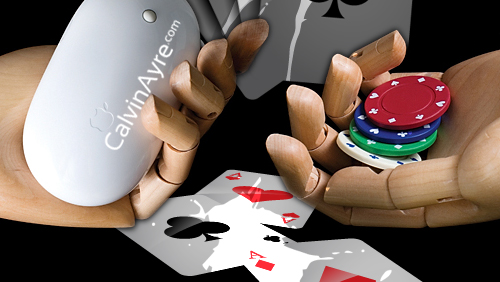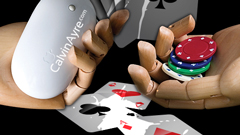 Over the past few months, the potential for US iGaming has moved a number of stocks, ranging from several massive upward moves for shares of Caesars Entertainment (CZR) to last week’s freefall at Zynga (ZNGA) following news the social gaming giant would not pursue real-money gambling in the US. Both stocks have shown massive volatility over iGaming movements, as have other exposed companies, ranging from Boyd Gaming (BYD) and MGM Resorts International (MGM) in the US and overseas suppliers such as 888 Holdings (888.L) – a Caesars partner – and bwin.Party Digital Entertainment (BPTY.L).
Over the past few months, the potential for US iGaming has moved a number of stocks, ranging from several massive upward moves for shares of Caesars Entertainment (CZR) to last week’s freefall at Zynga (ZNGA) following news the social gaming giant would not pursue real-money gambling in the US. Both stocks have shown massive volatility over iGaming movements, as have other exposed companies, ranging from Boyd Gaming (BYD) and MGM Resorts International (MGM) in the US and overseas suppliers such as 888 Holdings (888.L) – a Caesars partner – and bwin.Party Digital Entertainment (BPTY.L).
The often bipolar reaction of investors to the space stands in sharp contrast to the relatively mundane pace and nature of US iGaming legalization so far. In the wake of the late 2011 re-interpretation of the 1961 Wire Act, most observers would have anticipated a far more developed American iGaming market. Certainly, few would have guessed that, by the end of 2013, just three states, representing barely four percent of the US population, would have legalized online gambling, with federal regulation seemingly stalled.
Yet investor enthusiasm for online poker continues apace; one need look no further than Caesars shares, who have been kept afloat almost solely by iGaming optimism. But even if US politicians begin to legalize gambling, there are real questions about the industry’s profitability, and most importantly, the ability of those companies to create real, consistent, returns for shareholders. With online poker – the likely focus of future state initiatives and any viable federal bill – the likely cornerstone of US iGaming, it’s worth looking across the pond to Europe, to see how companies and investors have fared with regulated, publicly traded poker companies. In a three-part series, we’ll look today and next week at the history of publicly traded online operators, and then review the lessons for investors and shareholders now and in the future.
It Begins
In reviewing the results of the early half of the 2000s for publicly traded operators, what jumps out is the massive revenue growth seen from 2001 to 2005-2006, the height of the so-called “poker boom.” And what a boom it was. According to figures provided by Global Betting and Gaming Consultants in the 2007 annual report of PartyGaming (which would later merge with bwin), gross gaming revenue from online poker grew at an astounding 163 percent per year from 2003 to 2006.
PartyGaming would be the dominant player in the industry in the early days; according to its 2005 annual report, it held 41% of the online poker market, with PokerStars second at 13 percent and Sportingbet PLC’s Paradise Poker coming in third at just 7 percent. After launching a poker product in August 2001, PartyGaming posted nearly $10 million in revenue in 2002. By 2005, that number had grown to $859 million; including casino operations, PartyGaming had created nearly a billion dollars in annual revenue in little more than five years. The company was also incredibly profitable; its adjusted EBITDA (earnings before interest, taxes, depreciation, and amortization) margin, a measure of pre-tax profitability, stood at over 59 percent in the poker segment. By contrast, Harrah’s Entertainment – the predecessor to Caesars, the then-dominant and most profitable land-based operator in the US, and a company that would soon be bought out for some $28 billion – saw an EBITDA margin of just 21 percent that same year.
It was little wonder then that when PartyGaming went public in 2005, it wound up being valued at $8.5 billion. While that valuation seemed high – few companies in any sector trade at over eight times their sales – the staggering potential for growth in the industry, and PartyGaming’s incredible ability to turn revenues into profit seemed to outweigh the concerns about the company’s exposure to US regulation. Shares would rise 11 percent on the first day of trading. Still, there were plenty of doubters about the company’s future in America: a Guardian article at the time noted that at least two of Britain’s top ten fund managers “refused to invest because of those risks,” while one told colleagues that the company wasn’t even fit for a listing because of its ostensibly illegal activity in what was then a ‘grey’ US market. And yet, as the article’s subtitle noted, the poker website co-founded by a former phone sex operator had already become more valuable than esteemed British institutions Rolls Royce and grocer Sainsbury’s.
PartyGaming would become the biggest publicly traded poker operator, but it wasn’t alone. Sportingbet – recently purchased by William Hill (WMH.L) and GVC Holdings (GVC.L) – would become the first publicly traded company to operate a poker website when it paid $340 million for Paradise Poker in October 2004. That price quickly looked like a steal; when the company announced results for the twelve months ending July 31, 2005, its poker rake had risen 89 percent from the year prior period. Despite being part of the company for only three-quarters of the year, Paradise Poker would supply 47% of the company’s operating profit, some $40 million.
Paradise’s sticker tag looked even better in the wake of a number of public offerings. Beyond PartyGaming, both 888 and Empire Online went public in the summer of 2005 with valuations in the range of $1 billion apiece. All told, the online poker industry – including privately held companies such as PokerStars and Ultimate Bet – looked to be worth somewhere in the range of 20-25 billion dollars, a stunning development for a business that had only begun with the first hand dealt on Planet Poker less than eight years earlier.
Looking back, it’s easy to assume that these valuations were the result of a “bubble,” a smaller version of the dot-com euphoria that exploded a few years earlier. But, across the board, online poker companies were profitable – indeed, massively so – and growing. PartyGaming’s 2006 interim report showed growth in the first half of the year coming in at 51 percent in terms of revenue and 42 percent in terms of earnings per share. EBITDA margins dropped modestly, but at 57.4 percent company-wide dwarfed those seen in almost any industry. Similarly, Sportingbet had shown year-over-year profit growth over 70 percent in the year ending July of 2006, driven in part by revenue growth in poker of 136 percent. The online poker business was real; it was insanely profitable; and it was about to be devastated.
UIGEA
The 2006 Unlawful Internet Gambling Enforcement Act (UIGEA) would bring massive change to the online poker industry. The same companies that had so happily taken money from public shareholders would now be forced to leave the lucrative US market to protect those very shareholders. PartyGaming and Paradise Poker – number one and number three in market share at the end of 2005 – would immediately exit the US market.
Bloomberg would note at the time that UIGEA’s backdoor passage – attached quietly to an anti-terrorism bill, few representatives appeared to even have known it was on the docket – would destroy some $7 billion in market value in the day after its announcement. Shares of PartyGaming fell 58 percent; 888 slid 26 percent. Sportingbet fell 64 percent, as its bargain-basement purchase of Paradise Poker turned into a nightmare; the company would later sell the US operations of the site for just $1. Empire Online lost 25 percent; online payment processor Neteller would decline 61 percent. (Within months, two Neteller executives would plead guilty to conspiracy charges; soon after, the stock would be delisted, essentially wiping out shareholders.) They weren’t the only ones; in a sign that investors had perhaps neglected to consider the now-proven political risks, Bloomberg noted that there were 23 online gambling stocks listed on the London market alone.
The bloodbath left an opening for privately held companies to control the US market and use that liquidity advantage to take over market share. And, indeed, PokerStars would quickly assume PartyGaming’s place atop the online poker market. Within years, PartyGaming’s dominant market share position, representing half the online poker market, had been ceded to PokerStars; even a combined bwin.Party now has only a single-digit market share.
And while many have credited PokerStars’ decision to stay private as a key factor in its subsequent growth, it’s worth pointing out that Stars itself was, according to multiple sources, planning an IPO of its own. The Times reported in June 2006 that the company had hired an adviser in connection with a $3 billion initial public offering, only later to report that fears of a “crackdown” on online gambling in America would delay the float. That delay would save the company, which would would spend the next five years cementing its dominance of the online poker industry.
Part II of this series will be published next Monday.
